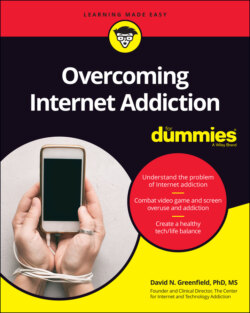Читать книгу Overcoming Internet Addiction For Dummies - David N. Greenfield - Страница 12
Understanding How and Why People Get Addicted to Screens and the Internet
ОглавлениеSo, what about the Internet? And how exactly do you become addicted to a digital screen connected to the Internet? Well, the answer is not all that different from how you become addicted to other behaviors and substances. Part of what happens with screen use (when linked to the Internet) is that you’re accessing content that is stimulating and rewarding to you, but because the delivery mechanism of this digital drug is variable (meaning you don’t know what you will get, when you will get it, and how desirable it will be for you), your brain receives a variably rewarding experience. Each time you get a reward, you receive a small hit of dopamine in your mid-brain (also called the limbic system). This unpredictability, or maybe factor, is very resistant to extinction or, putting it another way, addictive.
This is the same way that addiction to gambling works, and that is why I call the Internet the “world’s largest slot machine” (see Chapter 3 for more information). Each time you pull the handle on a slot machine or click your mouse, you might win; with gambling, you might win some money — on the Internet, you might win some form of desirable content.
Screen technology is essentially doing the same thing that drugs, alcohol, and gambling do. Obviously, there are differences between the various types of addictions, but the underlying neurobiology is essentially the same. You tend to repeat behaviors that are pleasurable, and the perception of that pleasure is often unconscious and largely biological; the impacts these addictive patterns have are more often behavioral and psychological, but the underpinnings of all addictions are neurobiological.
Many people can experience the excitement and rewards of the Internet and most forms of digital content with few problems, although you will frequently hear people complain about of how addicted they feel to their smartphones, Facebook, TikTok, Instagram, Snapchat, Reddit, Twitter, pornography, video games, YouTube, and even streaming sites like Amazon Prime, Hulu, and Netflix. The reality is that some people are unable to limit their use of these forms of content online, and because the Internet delivery system operates on a variable reinforcement schedule, the brain gets used to the maybe factor that helps produce the addictive response. The pleasure part of the brain (see Chapter 2) responds with increases in dopamine, and the unpredictability of what, how much, and when helps create a digital addictive experience. Obviously, the content you might like and respond favorably to will vary, but the Internet has so much available content that it is easy to understand why many people feel addicted to their screens (the reality is that many people are overusing their screens, but may not be addicted).
It’s perhaps important to note here that feeling addicted to your screen may not mean that you are. Many of us are aware of our overuse of our screens, but it may not have risen to a point that meets addiction criteria. Nevertheless, it can be a lifestyle problem that you should address by making some changes in how and when you use your Internet technology. I talk about signs and symptoms of Internet and screen addiction later in this chapter.
Addiction represents an extreme problem with a drug or behavior, but it has different levels of severity just like any illness or behavioral health problem. The levels of addiction can range from mild to severe, with each level representing more significant negative impacts on your behavior and functioning. At the lowest level of impact, you might be overusing your technology and screens to a point where you’re eating up too much time and energy that might be better spent on other tasks and activities. At the most extreme level, I have seen people whose lives have been severely impacted and limited by their screen use. It is perhaps fair to say that most of us (at times) fall into some level of overuse, abuse, or addiction to Internet technology.
The science and practice of addictionology and addiction medicine define addiction in the same way, whether it involves using substances or engaging in compulsive behaviors. The American Society of Addiction Medicine gives the following more complete definition of addiction:
Addiction is a primary, chronic disease of brain reward, motivation, memory, and related circuitry. Dysfunction in these circuits leads to characteristic biological, psychological, social, and spiritual manifestations. This is reflected in an individual pathologically pursuing reward and/or relief by substance use and other behaviors. Addiction is characterized by inability to consistently abstain, impairment in behavioral control, craving, diminished recognition of significant problems with one’s behaviors and interpersonal relationships, and a dysfunctional emotional response. Like other chronic diseases, addiction often involves cycles of relapse and remission. Without treatment or engagement in recovery activities, addiction is progressive and can result in disability or premature death.
